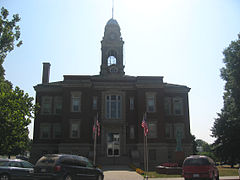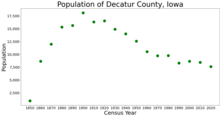Decatur County, Iowa
Decatur County | |
|---|---|
 | |
 Location within the U.S. state of Iowa | |
 Iowa's location within the U.S. | |
| Coordinates: 40°44′29″N 93°46′51″W / 40.741388888889°N 93.780833333333°W | |
| Country | |
| State | |
| Founded | 1846 |
| Named for | Stephen Decatur Jr. |
| Seat | Leon |
| Largest city | Lamoni |
| Area | |
• Total | 533 sq mi (1,380 km2) |
| • Land | 532 sq mi (1,380 km2) |
| • Water | 1.6 sq mi (4 km2) 0.3% |
| Population (2020) | |
• Total | 7,645 |
| • Density | 14/sq mi (5.5/km2) |
| Time zone | UTC−6 (Central) |
| • Summer (DST) | UTC−5 (CDT) |
| Congressional district | 3rd |
| Website | www |
Decatur County (/dɪˈkeɪtər/) is a county located in the U.S. state of Iowa. As of the 2020 census, the population was 7,645.[1] The county seat is Leon.[2] This county is named for Stephen Decatur Jr., a hero in the War of 1812.[3]
History
[edit]Decatur County was organized in 1850 and named for Stephen Decatur, a naval hero of the War of 1812. The current courthouse was dedicated in 1908.[4]
Geography
[edit]According to the U.S. Census Bureau, the county has a total area of 533 square miles (1,380 km2), of which 532 square miles (1,380 km2) is land and 1.6 square miles (4.1 km2) (0.3%) is water.[5]

Major highways
[edit]Transit
[edit]Adjacent counties
[edit]- Clarke County (north)
- Wayne County (east)
- Mercer County, Missouri (southeast)
- Harrison County, Missouri (southwest)
- Ringgold County (west)
Demographics
[edit]| Census | Pop. | Note | %± |
|---|---|---|---|
| 1850 | 965 | — | |
| 1860 | 8,677 | 799.2% | |
| 1870 | 12,018 | 38.5% | |
| 1880 | 15,336 | 27.6% | |
| 1890 | 15,643 | 2.0% | |
| 1900 | 18,115 | 15.8% | |
| 1910 | 16,347 | −9.8% | |
| 1920 | 16,566 | 1.3% | |
| 1930 | 14,903 | −10.0% | |
| 1940 | 14,012 | −6.0% | |
| 1950 | 12,601 | −10.1% | |
| 1960 | 10,539 | −16.4% | |
| 1970 | 9,737 | −7.6% | |
| 1980 | 9,794 | 0.6% | |
| 1990 | 8,338 | −14.9% | |
| 2000 | 8,689 | 4.2% | |
| 2010 | 8,457 | −2.7% | |
| 2020 | 7,645 | −9.6% | |
| 2023 (est.) | 7,665 | [6] | 0.3% |
| U.S. Decennial Census[7] 1790-1960[8] 1900-1990[9] 1990-2000[10] 2010-2018[11] | |||

2020 census
[edit]
The 2020 census recorded a population of 7,645 in the county, with a population density of 14.3482/sq mi (5.5399/km2). 96.44% of the population reported being of one race. There were 3,653 housing units of which 2,986 were occupied.[1]
| Race | Num. | Perc. |
|---|---|---|
| White (NH) | 7,010 | 91.7% |
| Black or African American (NH) | 97 | 1.26% |
| Native American (NH) | 17 | 0.22% |
| Asian (NH) | 39 | 0.51% |
| Pacific Islander (NH) | 21 | 0.27% |
| Other/Mixed (NH) | 250 | 3.3% |
| Hispanic or Latino | 211 | 2.8% |
2010 census
[edit]The 2010 census recorded a population of 8,457 in the county, with a population density of 15.897/sq mi (6.138/km2). There were 3,834 housing units, of which 3,223 were occupied.[13]
2000 census
[edit]At the 2000 census,[14] there were 8,689 people, 3,337 households and 2,149 families residing in the county. The population density was 16 per square mile (6.2/km2). There were 3,833 housing units at an average density of 7 per square mile (2.7/km2). The racial makeup of the county was 96.46% White, 0.98% Black or African American, 0.24% Native American, 0.63% Asian, 0.12% Pacific Islander, 0.46% from other races, and 1.12% from two or more races. 1.70% of the population were Hispanic or Latino of any race.
There were 3,337 households, of which 28.00% had children under the age of 18 living with them, 54.30% were married couples living together, 7.20% had a female householder with no husband present, and 35.60% were non-families. 30.30% of all households were made up of individuals, and 15.50% had someone living alone who was 65 years of age or older. The average household size was 2.37 and the average family size was 2.96.
23.00% of the population were under the age of 18, 16.30% from 18 to 24, 21.60% from 25 to 44, 21.50% from 45 to 64, and 17.70% who were 65 years of age or older. The median age was 36 years. For every 100 females there were 95.70 males. For every 100 females age 18 and over, there were 91.90 males.
The median household income was $27,343 and the median family income was $34,831. Males had a median income of $25,569 compared with $19,309 for females. The per capita income for the county was $14,209. About 10.90% of families and 15.50% of the population were below the poverty line, including 15.60% of those under age 18 and 13.70% of those age 65 or over.
Decatur County is considered to be the poorest in Iowa, reporting that almost 20% of its residents live in poverty.[15]
County officials
[edit]Supervisors
Steve Fulkerson
Doug Tharp
Ward Graham
Treasurer
Janet Pierson
Attorney
Alan Wilson
Auditor
Charlene Hoover
Recorder
Erica Cook
Sheriff
Chris Lane
Assessor
Justin Cornett
Engineer
Justin Savage
Clerk of Court
Traci Tharp
Public Health Administrator
Shelley Bickel
Veterans Affairs Administrator
Samantha Schaff
Conservation Director
Kayla Clausen
Mental Health Director
Kathy Lerma
Communities
[edit]
Cities
[edit]Townships
[edit]Decatur County is divided into these townships:
Population ranking
[edit]The population ranking of the following table is based on the 2020 census of Decatur County.[1]
† county seat
| Rank | City/Town/etc. | Municipal type | Population (2020 Census) |
|---|---|---|---|
| 1 | Lamoni | City | 1,969 |
| 2 | † Leon | City | 1,822 |
| 3 | Grand River | City | 196 |
| 4 | Davis City | City | 179 |
| 5 | Van Wert | City | 178 |
| 6 | Decatur City | City | 175 |
| 7 | Garden Grove | City | 174 |
| 8 | Weldon (partially in Clarke County) | City | 136 |
| 9 | Pleasanton | City | 32 |
| 10 | Le Roy | City | 11 |
Politics
[edit]| Year | Republican | Democratic | Third party(ies) | |||
|---|---|---|---|---|---|---|
| No. | % | No. | % | No. | % | |
| 2020 | 2,615 | 68.74% | 1,120 | 29.44% | 69 | 1.81% |
| 2016 | 2,296 | 61.49% | 1,201 | 32.16% | 237 | 6.35% |
| 2012 | 1,947 | 50.80% | 1,791 | 46.73% | 95 | 2.48% |
| 2008 | 2,020 | 49.20% | 1,986 | 48.37% | 100 | 2.44% |
| 2004 | 2,088 | 52.06% | 1,859 | 46.35% | 64 | 1.60% |
| 2000 | 1,903 | 51.31% | 1,674 | 45.13% | 132 | 3.56% |
| 1996 | 1,287 | 35.52% | 1,846 | 50.95% | 490 | 13.52% |
| 1992 | 1,316 | 33.02% | 1,866 | 46.81% | 804 | 20.17% |
| 1988 | 1,406 | 38.76% | 2,192 | 60.44% | 29 | 0.80% |
| 1984 | 2,104 | 49.60% | 2,098 | 49.46% | 40 | 0.94% |
| 1980 | 2,212 | 47.67% | 2,048 | 44.14% | 380 | 8.19% |
| 1976 | 1,932 | 41.05% | 2,698 | 57.32% | 77 | 1.64% |
| 1972 | 2,638 | 57.44% | 1,880 | 40.93% | 75 | 1.63% |
| 1968 | 2,261 | 49.28% | 2,057 | 44.83% | 270 | 5.88% |
| 1964 | 1,542 | 31.57% | 3,331 | 68.19% | 12 | 0.25% |
| 1960 | 3,039 | 55.69% | 2,411 | 44.18% | 7 | 0.13% |
| 1956 | 2,912 | 50.86% | 2,806 | 49.01% | 7 | 0.12% |
| 1952 | 3,621 | 58.71% | 2,521 | 40.87% | 26 | 0.42% |
| 1948 | 2,547 | 43.89% | 3,172 | 54.66% | 84 | 1.45% |
| 1944 | 2,934 | 46.81% | 3,316 | 52.90% | 18 | 0.29% |
| 1940 | 3,494 | 46.91% | 3,938 | 52.87% | 16 | 0.21% |
| 1936 | 3,327 | 44.40% | 4,131 | 55.12% | 36 | 0.48% |
| 1932 | 2,148 | 36.84% | 3,591 | 61.60% | 91 | 1.56% |
| 1928 | 3,942 | 59.06% | 2,675 | 40.07% | 58 | 0.87% |
| 1924 | 3,221 | 47.13% | 1,693 | 24.77% | 1,921 | 28.11% |
| 1920 | 4,187 | 61.17% | 2,592 | 37.87% | 66 | 0.96% |
| 1916 | 1,962 | 47.45% | 2,111 | 51.05% | 62 | 1.50% |
| 1912 | 1,351 | 34.39% | 1,659 | 42.24% | 918 | 23.37% |
| 1908 | 2,149 | 52.53% | 1,809 | 44.22% | 133 | 3.25% |
| 1904 | 2,430 | 58.44% | 1,548 | 37.23% | 180 | 4.33% |
| 1900 | 2,415 | 53.21% | 2,058 | 45.34% | 66 | 1.45% |
| 1896 | 2,268 | 48.46% | 2,362 | 50.47% | 50 | 1.07% |
See also
[edit]- Decatur County Courthouse (Iowa)
- National Register of Historic Places listings in Decatur County, Iowa
References
[edit]- ^ a b c "2020 Census State Redistricting Data". census.gov. United states Census Bureau. Retrieved August 12, 2021.
- ^ "Find a County". National Association of Counties. Archived from the original on May 31, 2011. Retrieved June 7, 2011.
- ^ Gannett, Henry (1905). The Origin of Certain Place Names in the United States. Govt. Print. Off. p. 102.
- ^ "County History". Dacatur County. Retrieved July 8, 2020.
- ^ "US Gazetteer files: 2010, 2000, and 1990". United States Census Bureau. February 12, 2011. Retrieved April 23, 2011.
- ^ "Annual Estimates of the Resident Population for Counties: April 1, 2020 to July 1, 2023". United States Census Bureau. Retrieved April 2, 2024.
- ^ "U.S. Decennial Census". United States Census Bureau. Retrieved July 16, 2014.
- ^ "Historical Census Browser". University of Virginia Library. Retrieved July 16, 2014.
- ^ "Population of Counties by Decennial Census: 1900 to 1990". United States Census Bureau. Retrieved July 16, 2014.
- ^ "Census 2000 PHC-T-4. Ranking Tables for Counties: 1990 and 2000" (PDF). United States Census Bureau. Archived (PDF) from the original on March 27, 2010. Retrieved July 16, 2014.
- ^ "State & County QuickFacts". United States Census Bureau. Archived from the original on June 7, 2011. Retrieved July 16, 2014.
- ^ "P2 HISPANIC OR LATINO, AND NOT HISPANIC OR LATINO BY RACE – 2020: DEC Redistricting Data (PL 94-171) – Decatur County, Iowa".
- ^ "Population & Housing Occupancy Status 2010" (PDF). United States Census Bureau American FactFinder. Archived (PDF) from the original on October 16, 2020. Retrieved August 15, 2022.
- ^ "U.S. Census website". United States Census Bureau. Retrieved January 31, 2008.
- ^ Mike Kilen, "Headline: Who will win in Iowa's poorest county?", Des Moines Register, June 6, 2004 (subscription required)
- ^ Leip, David. "Dave Leip's Atlas of U.S. Presidential Elections". uselectionatlas.org. Retrieved April 25, 2018.
Further reading
[edit]- Meyer, Theodoric. "Two Iowa counties an hour apart show America’s growing political divide: Rural Decatur County has moved sharply red, while suburban Dallas County has shifted the other direction" Washington Post January 12, 2024, online

